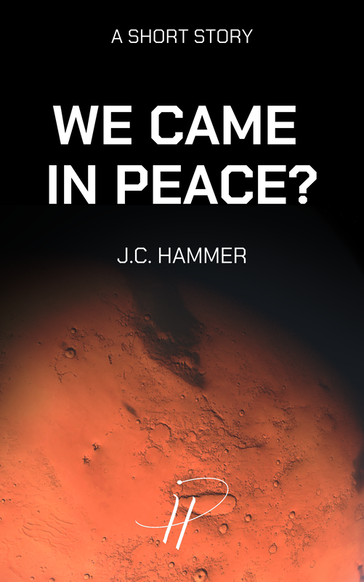We Came in PEace
|
Back cover description:
What makes you think humans will be different on any other planet? Original Prose prompt:
You made the cut and are safely on Mars in your domicile, week 1, staring at the red landscape. On Earth, the certainty of Doomsday made you feel lucky to make the draw, yet Earth is still there. You can’t return home. What's ahead of you? WE CAME IN PEACE Everyone hears new and they think different or better. That’s about as true as the iPhone 25 being different from the iPhone 24, or Windows Vista being better than, well, anything. Humans on Mars? Sure that’s new. There’s nothing different about us, though. Nothing better. They didn’t exactly take the best of us with them. Sure, we’ve got a couple scientists, a few doctors here and there, but they’re all around to serve the greater purpose, the Cause. We think we’re so feckin’ righteous with our idea of bringing peace to the universe with our buckets of bombs and a brigade of adolecent Marines. I don’t know if you’ve seen Marines at the bar or on shore leave, but there’s nothing peaceful about that circus. I know you haven’t seen them at their business end, because you wouldn’t be alive to read this if you had. It’s kind of ironic, though. The same thing that wasted Earth is the same thing that helped me escape from it. I commissioned in the Marine Corps fresh out of college—one of only two women in my class, actually—thinking it would help get me out of the violent neighborhood I grew up in. Turns out joining the Marine Corps is the wrong thing to do if you want to avoid violent neighborhoods. Who would have guessed? My job is to actually make neighborhoods violent. But, it was the military that gave me my ticket off Earth, though all I’ve done is bring the fight with me. We took the same nukes that made quick work of everything living on Earth and we used them to power the ships that would shuttle the remaining broken bits to Mars, like some sort of radioactive lifeboat escaping our flaming wreck of a mothership. Now, it’s my job, our job, to make sure that the resources on our new home are secured for the “friends of freedom”, using the Marine Corps’ trademark democratic persuasion to encourage the rest of Earth’s survivors to agree. So, now I’m here, staring through my inch-wide slit of a window at a cloud of red dust swirling feebly in the tenuously thin atmosphere. There’s a persistent buzzing that pecks at my attention, slowly eroding my sanity. Of course they put the LT next to the compound’s generator; if the Eastern Alliance doesn’t kill me, I’m sure this noise will, or maybe the cancer. But it’s all the same to me. Everyone dies in one way or another. At first, I felt lucky to be one of the few to survive the flaming outhouse called Earth, but it’s been a week now since arriving, and I’m starting to realize that the ones left behind were the lucky ones. Food and water are rationed, the air is recycled and barely breathable, and my travel options—for the rest of my life—are limited to the ping-pong room and the mess hall—my bullet proof options, that is. I’m eager to get out of this bunker inside of a bunker inside of a barracks. It’s too safe. Marines weren’t meant to be caged like a pet. The klaxon alarm suddenly sounds, accompanied by the frantically flashing red lights that line the walls of my platoon’s hallway; it could be a drill, like the countless others this week, but something about the timing of it all suggests otherwise. I jump off of my rack excitedly and practically fly into my form-fitting EVA suit, then grab my rifle and head out the door. My platoon is already gathering by the airlocks that lead to the pressurized troop crawlers, organized into fire teams and squads. It’s a sight that never fails to send shivers running up my back. Time to bring liberty to the Red Planet. |
